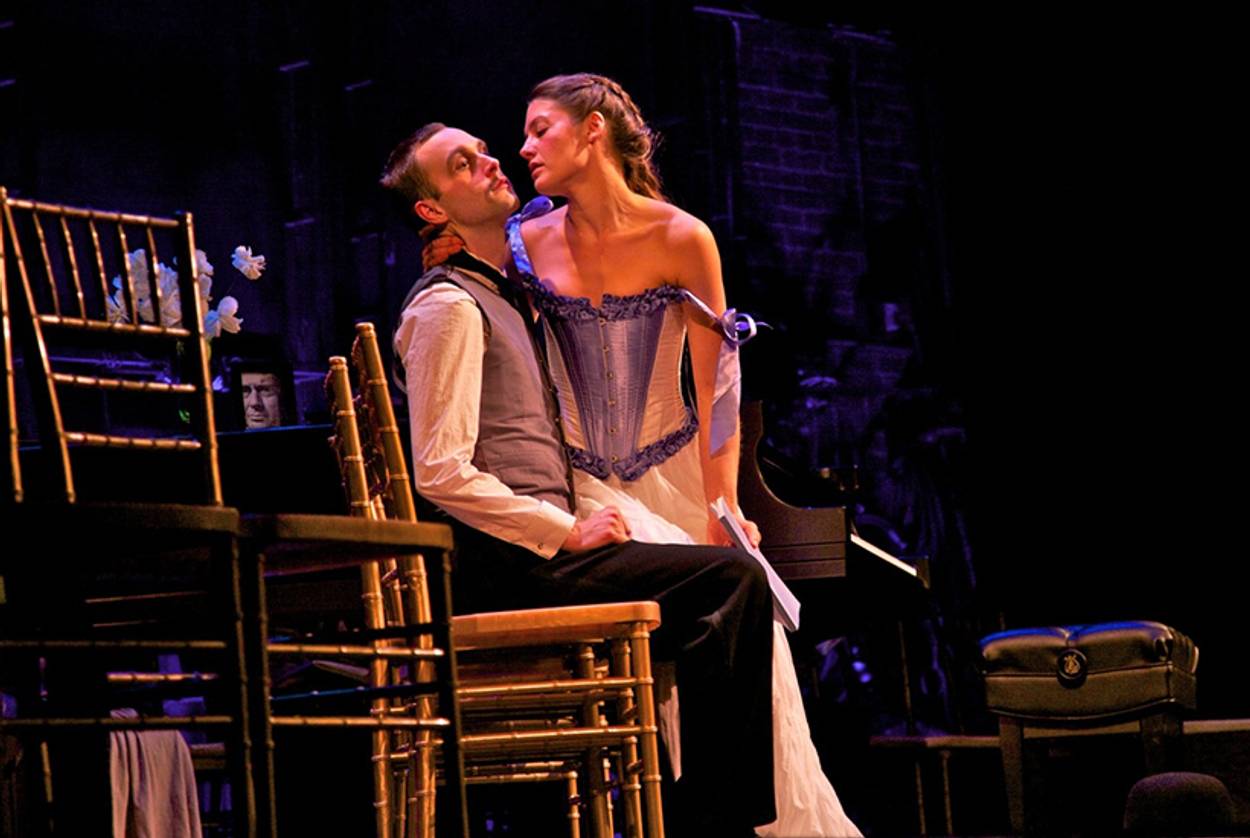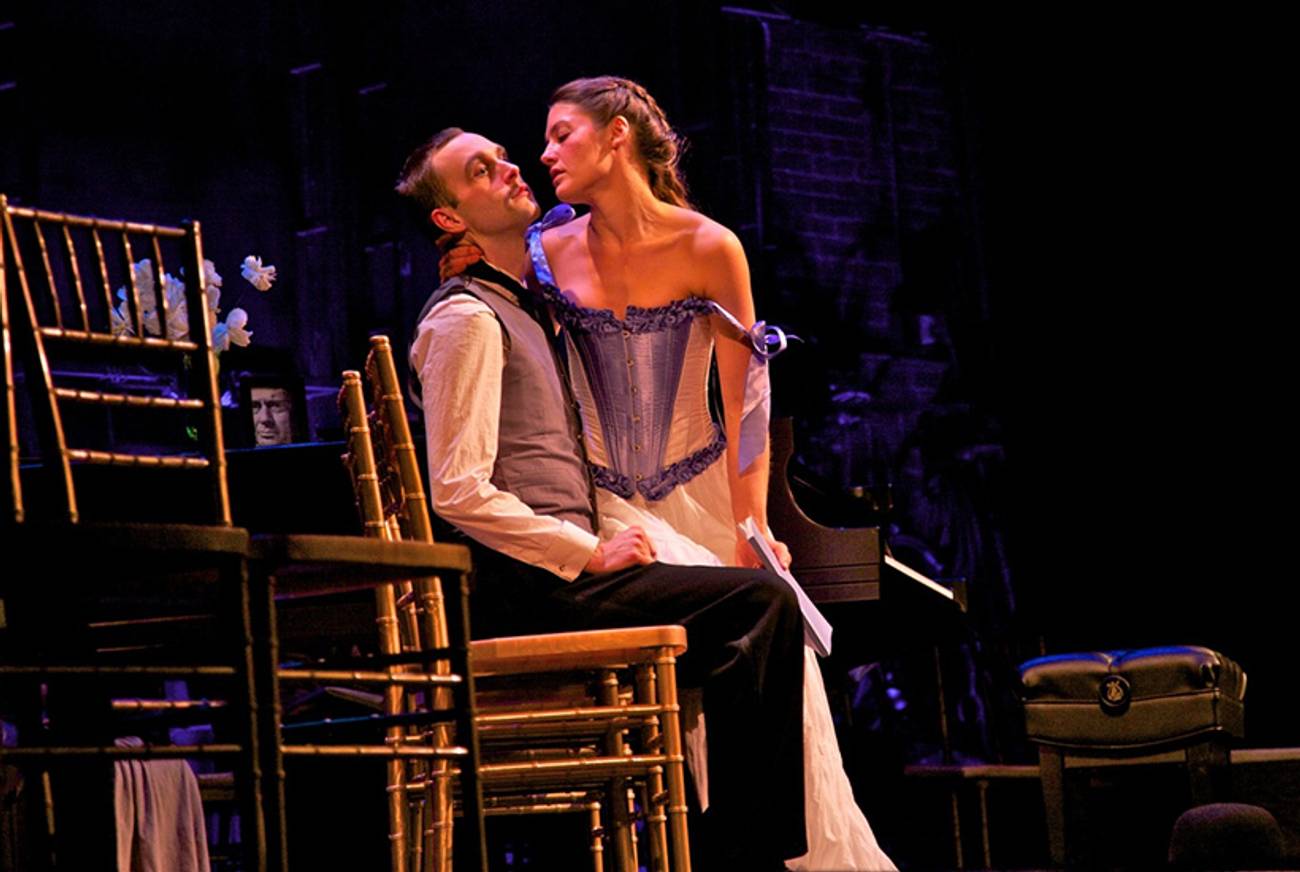All the Dirty Bits of Marcel Proust, by Harold Pinter
On stage, the English master of menace and the ponderous Frenchman find a common language in a feat of adaptation




The first contestant takes the stage. He is nervous. His task is to summarize Marcel Proust’s 3,031-page-long À la Recherche du Temps Perdu.
“Proust’s novel ostensibly tells of the irrevocability of time lost, the forfeiture of innocence through experience,” he says breathlessly, “the reinstallment of extra-temporal values of time regained, ultimately the novel is both optimistic and set within the context of a humane religious experience, re-stating as it does the concept of intemporality. In the first volume, Swann, the family friend visits … ”
Time runs out. The man, having failed, is asked about his other hobbies. “Strangling animals, golf, and masturbation,” he replies. He is whisked off camera to uneasy laughs.
So begins one of Monty Python’s most celebrated skits. We could do worse than to describe it as Pinteresque: minimal plotting, unpredictable dialogue, all leading to a moment in which—to borrow the useful phrasing of the Swedish Academy’s citation when it awarded Harold Pinter the Nobel in 2005—“people are at the mercy of each other and pretence crumbles.” A concerto of barbs and silences, the Monty Python skit is funny because it assaults the very possibility that Proust’s dreamy, exhaustive, sensual, magnificent book could be adapted into a fleeting performance on stage. Or, to put it more crudely, it’s funny because it stands to reason that the menacing Pinter is the opposite of the meandering Proust.
But this is wrong. As a rare staging of Pinter’s adaptation of Proust’s masterwork last week at the 92nd Street Y proved, the two men seemed to have understood each other very well—the playwright capturing the novelist’s thrusts on stage without any of the anguish that befell Monty Python’s miserables. Seeing the play—aptly titled Pinter/Proust, directed by Di Trevis and Ed Sylvanus Iskandar—performed made it clear that Pinter wasn’t summarizing Proust but rather using the Frenchman’s words to correspond with him across decades and across forms of artistic expression.
“For three months I read À la Recherche du Temps Perdu every day,” Pinter wrote in the introduction to his script. “I took hundreds of notes.” He was working with the director Joseph Losey and the BBC editor Barbara Bray, hoping to raise the money for a film adaptation of the novel. Or not exactly an adaptation: “We decided,” Pinter continued, “that the architecture of the film should be based on two main and contrasting principles: one, a movement, chiefly narrative, toward disillusion, and the other, more intermittent, toward revelation, rising to where time that was lost is found and fixed forever in art.” Could there be a better summary of Proust’s achievement?
To capture all that disillusionment, Pinter pulled out those threads of the novel in which loved ones appear in a harsh new light, often due to dalliances with members of the same sex. Albertine, Marcel’s lover, squirms as she denies an affair with an older actress. Her friend, Andrée, purrs as she reveals to Marcel the extent of Albertine’s lustful indiscretions. The violinist Morel pounces as he accuses his former friend and patron, the decadent Baron de Charlus, of trying to seduce him. All three moments are shocking because they turn one lover against another and leave both standing awkwardly amid the shards of their shattered intimacy, unsure of what to say. When these moments arrive in the novel, they are vaguely cathartic, following, as they do, hundreds of pages of exposition, a very slow build-up. On stage, however, they arrive without warning and without context; if you don’t know the novel, you may be forgiven for mistaking what you’re watching for another of Pinter’s early comedies of menace, where pretenses don’t crumble as much as they are shred.
That alone would have made for a mildly satisfying adaptation, a Po-Mo Proust made up entirely of breakdowns and dedicated ever more clearly to exploring the novel’s subtlest and strongest theme, homosexuality. But Pinter is never so crude. For him, as for Proust, what’s interesting is the way in which all this unknowability that makes life so dense transforms, once reproduced as art, into an illumination. Even though the stage is largely bare, then, even though the chorus line of actors who do double and triple duty as a whole gallery of characters shuffle in and out on cue, Marcel is always there, observing. He never addresses the audience, yet he is clearly our narrator, busy, like us all in our own lives, alternating between taking center stage for a few key scenes and shuffling off to the side to watch friends and family members enact their small dramas in others.
By the time Marcel delivers the play’s final line—“it was time to begin”—we, like the play, like the novel, have come full circle. The literary theorist Gérard Genette summed up the book perfectly after all; it was, he memorably said, all about Marcel becoming a writer. As you read the book’s last lines, and as you watch the play’s final moments, you realize that everything that preceded Marcel’s burst of clarity—thousands of pages, dozens of staged scenes—everything, in short, that you’ve just been reading and watching and contemplating, all of it has been nothing more than Marcel’s sublime work of art, no more than a writer’s careful fabrication. Not that you feel cheated: On stage and on page, all that is fleeting and hurtful and dark in life is fixed forever in art, beautiful and tender and sweet. May we only have more time to read Proust’s monumental book, and more opportunities to revel in Pinter’s immense achievement.
***
Like this article? Sign up for our Daily Digest to get Tablet Magazine’s new content in your inbox each morning.
Liel Leibovitz is a senior writer for Tablet Magazine and a host of the Unorthodox podcast.
Liel Leibovitz is editor-at-large for Tablet Magazine and a host of its weekly culture podcast Unorthodox and daily Talmud podcast Take One. He is the editor of Zionism: The Tablet Guide.